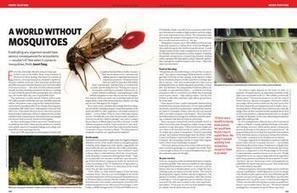Eradicating any organism would have serious consequences for ecosystems — wouldn’t it? Not when it comes to mosquitoes.
Malaria infects some 247 million people worldwide each year, and kills nearly one million. Mosquitoes cause a huge further medical and financial burden by spreading yellow fever, dengue fever, Japanese encephalitis, Rift Valley fever, Chikungunya virus and West Nile virus. Then there’s the pest factor: they form swarms thick enough to asphyxiate caribou in Alaska and now, as their numbers reach a seasonal peak, their proboscises are plunged into human flesh across the Northern Hemisphere.
So what would happen if there were none? Would anyone or anything miss them? Nature put this question to scientists who explore aspects of mosquito biology and ecology, and unearthed some surprising answers.
Effective Altruist Opportunity
No programs exist today to completely eradicate malaria-carrying mosquitos. The focus is always on reducing wild populations with pesticides or distributing pesticide treated bed nets — even though less toxic and more permanent interventions like SIT (sterile insect technique) have been used before to permanently eradicate disease carrying insects.
See on www.nature.com
